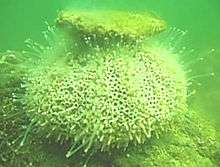Toxopneustes
Toxopneustes is a genus of sea urchins from the tropical Indo-Pacific. It contains four species. They are known to possess medically significant venom to humans on their pedicellariae (tiny claw-like structures). They are sometimes collectively known as flower urchins, after the most widespread and most commonly encountered species in the genus, the flower urchin (Toxopneustes pileolus). Species included in the genus are the following:[1][2][3][4]
- Toxopneustes elegans Döderlein, 1885
- Restricted to waters around Japan. Can be distinguished by the presence of a distinctive dark stripe just below the tips of their spines.
- Toxopneustes maculatus (Lamarck, 1816)
- Very rare species found in the Indo-West Pacific. Known only from specimens from Réunion, Christmas Island, and the Palmyra Atoll. Can be distinguished by bright violet coloration on the bottom and in a band around the middle of their tests.
- Toxopneustes pileolus (Lamarck, 1816)
- Common and widespread in the Indo-West Pacific, from East Africa to the Cook Islands. Can be distinguished by variegated red, grey, green, or purple coloration of their tests.
- Toxopneustes roseus (A. Agassiz, 1863)
- Restricted to the East Pacific, along the coasts of California, Mexico, Central America, and part of South America (including the Galapagos Islands). Can be distinguished by the uniform coloration of their tests of pink, brown, or purple.
| Toxopneustes | |
|---|---|
.jpg) | |
| The flower urchin (Toxopneustes pileolus) is potentially dangerous to humans | |
| Scientific classification | |
| Kingdom: | |
| Phylum: | |
| Class: | |
| Order: | |
| Family: | |
| Genus: | Toxopneustes L. Agassiz, 1841 |
| Type species | |
| Echinus pileolus Lamarck, 1816 | |
| Synonyms[1] | |
| |
Gallery
gollark: CC doesn't limit RAM, but probably a few terabytes is enough.
gollark: They don't actually emulate them very in-depthly, or at all beyond a maybe limited-size filesystem mounted at `/disk` or `/diskX`.
gollark: The emulators emulate them fine.
gollark: ... yes?
gollark: It copies potatOS installers to floppy disks automatically to save you the effort.
See also
References
- Andreas Kroh (2014). Kroh A, Mooi R (eds.). "Toxopneustes pileolus (Lamarck, 1816)". World Echinoidea Database. World Register of Marine Species. Retrieved November 22, 2014.
- Wolfgang Bücherl & Eleanor E. Buckley (2013). Venomous Animals and Their Venoms: Venomous Invertebrates. Elsevier. pp. 427, 431. ISBN 9781483262895.
- Alexander Agassiz & Hubert Lyman Clark (1912). "Hawaiian and Other Pacific Echini: The Pedinidae, Phymosomatidae, Stomopneustidae, Echinidae, Temnopleuridae, Strongylocentrotidae, and Echinometridae". Memoirs of the Museum of Comparative Zoölogy at Harvard College. 34 (4): 207–383.
- Hubert Lyman Clark (1925). A Catalogue of the Recent Sea-Urchins (Echinoidea) in the Collection of the British Museum (Natural History). Oxford University Press. pp. 122–123.
This article is issued from Wikipedia. The text is licensed under Creative Commons - Attribution - Sharealike. Additional terms may apply for the media files.

